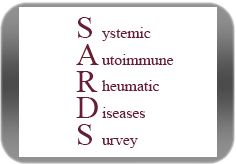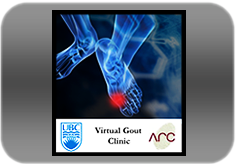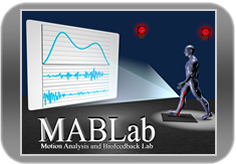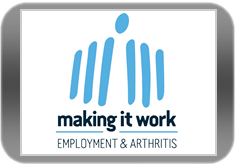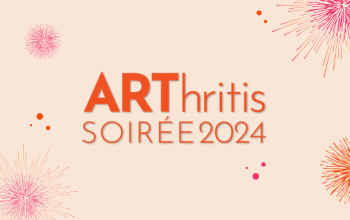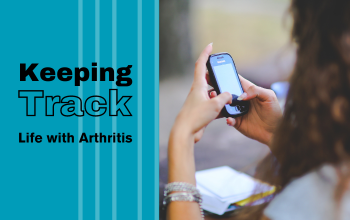The Arthritis Newsletter
Spring 2013Participating in Research

Research study participants play a crucial role in arthritis research, and much of the research completed at Arthritis Research Canada is made possible by the generous contribution of time by people like you. There are many opportunities for you to become involved; however, some patients are hesitant because they believe that all research studies are invasive. The truth is that some studies can be as simple as taking a survey, testing an interactive website or having a knee exam. And remember, your privacy and confidentiality are always protected.
Opportunities for you to get involved!
 OPAM-IA: Effectiveness of Online Physical Activity Monitoring in Inflammatory Arthritis: A new model of care
OPAM-IA: Effectiveness of Online Physical Activity Monitoring in Inflammatory Arthritis: A new model of care
We would like your help to test a new application that is paired with a Fitbit Flex (wireless activity tracker), combined with a physical activity counselling program to help people with rheumatoid arthritis (RA) or systemic lupus erythematosus (SLE) become more physically active in a safe way.
You may be eligible to participate if you:
- Have been diagnosed with RA or SLE.
- Have no previous diagnosis of fibromyalgia.
- Have an email address and access to a computer with internet on a daily basis.
If you are eligible, you will be one of the first to use this new application and provide feedback on its content. You will be asked to attend an education session, use a Fitbit Flex activity tracker, and receive counselling from a registered physiotherapist. Any information you provide will be completely confidential.
If you would like to take part in this study or seek more information, contact:
Navi Grewal: ngrewal@arthritisresearch.ca
604-207-4053 or toll free at 1.844.707.4053
 Understanding the Economic Impact of Systemic Autoimmune Rheumatic Diseases
Understanding the Economic Impact of Systemic Autoimmune Rheumatic Diseases
Systemic autoimmune rheumatic diseases, or SARDs, are a group of rare inflammatory disorders including:
- Systemic lupus erythematosus (lupus)
- Systemic sclerosis (scleroderma)
- Sjogren’s syndrome
- Polymyositis
- Dermatomyositis
- Systemic vasculitis
SARDs usually strike in early adulthood while individuals are completing their education, establishing careers, and starting families. Although treatments are available, SARDs still limit participation in paid work and other meaningful activities. However, the full economic impact these disabling disorders have on patients, their families, and society is underappreciated.
To better understand the costs and limitations resulting from SARDs, researchers from UBC and Arthritis Research Canada are asking people who have been diagnosed with a SARD about the activities they take part in (including paid work, school, housework, child/elder care, and volunteering), and out-of-pocket costs they face.
Participants will be asked to complete a short survey, either on paper or online. This study does not involve any visits. To help ensure a wide range of people with SARDs are included, we are mailing survey invitations to a random sample of SARD patients living across BC. If you receive an invitation package, please consider helping us with this research!
Contact:
Natalie McCormick: sardsurvey@arthritisresearch.ca
604.207.4045 or toll-free at 1.844.307.0400.
 SuPER: Supporting Patient care with Electronic Resource
SuPER: Supporting Patient care with Electronic Resource
Take charge of your health care!
We are inviting you to a study to test a web-based program that helps people with rheumatoid arthritis make decisions about using biologic treatments.
You may be eligible to participate if:
- You have Rheumatoid Arthritis
- Receive/have received ongoing care by a rheumatologist
- You are considering or reconsidering starting or switching biologics
- Have access to the Internet
You will get to be one of the first to use this new online program and provide feedback on its content. We will also ask you some general questions about your health. Any information you provide will be completely anonymous. An honorarium will be provided for your time.
When you complete the program, you will receive a printable personalized summary that you can take to your doctor and discuss your decision.
Contact:
Jasmina Geldman: jgeldman@arthritisresearch.ca
604.207.4007 or 1-877-871-4575
 MONITOR-OA: Improving Physical Activity Using an Online Monitoring Tool: A New Model for Knee Osteoarthritis
MONITOR-OA: Improving Physical Activity Using an Online Monitoring Tool: A New Model for Knee Osteoarthritis
Being physically active has been shown to reduce pain and improve quality of life in people with knee osteoarthritis. However, many people with osteoarthritis do not meet the recommended levels of physical activity. MONITOR-OA is a program that uses new digital activity trackers to help people with knee pain set goals to be more physically active safely and at their own pace.
You may be eligible to participate if you:
- Have knee pain, or have been diagnosed with knee osteoarthritis
- Have not had an acute knee injury in the last 6 months
- Have an email address and access to a computer with internet on a daily basis.
- Are able to attend a 1.5 hour session at the Mary Pack Arthritis Centre, Arthritis Research Canada, or a Fraser Health Facility.
For more information:
MONITOR-OA: Improving Physical Activity Using an Online Monitoring Tool: A New Model for Knee Osteoarthritis
Contact:
Navi Grewal: ngrewal@arthritisresearch.ca
604-207-4053 or 1-844-707-4053
 Virtual Gout Clinic
Virtual Gout Clinic
Gout affects over 1 million Canadians and is expected to increase with the aging of the population. Although appropriate gout therapy can effectively “cure” the disease, patients still experience continued poor outcomes. Researchers at the University of British Columbia and the Arthritis Research Centre of Canada in Vancouver are conducting a study to see if collaborative care between your rheumatologist, a pharmacist, and a dietician, with the use of electronic health technologies can better manage your gout symptoms. If you are followed by a rheumatologist, have received a gout diagnosis, and are 19 years old or older, you are being invited to participate in this one year study.
Contact:
Alyssa Howren: alyssa.howren@ubc.ca
 Knee Osteoarthritis Walking Program
Knee Osteoarthritis Walking Program
The Motion Analysis and Biofeedback Lab at the University of British Columbia is seeking volunteers with knee osteoarthritis to participate in a study assessing the effect of different walking programs on knee pain, knee joint loading, and overall physical function. Walking programs have been recommended for people with knee osteoarthritis to reduce pain and symptoms as well as increase mobility. These are inexpensive and noninvasive techniques that can be widely used. However, it is not clear how effective these programs are in altering other factors important to knee osteoarthritis, such as the loads that pass through the knee joint.
For more information:
Knee Osteoarthritis Walking Program Study
Contact:
Natasha Krowchuk: mablabstudies@gmail.com
 Employment and Arthritis: Making It Work
Employment and Arthritis: Making It Work
Do you have concerns about your arthritis affecting your ability to work? Arthritis is the #1 health condition causing Canadians to stop working. 1 out of 5 people with inflammatory arthritis is forced to stop working within five years of diagnosis. You can reduce your chances of having to stop working by making simple changes at work. The Making It Work program is a unique online eLearning program designed to reduce difficulties at work due to arthritis. If you have a form of inflammatory arthritis and you are working in paid employment, you may be eligible to participate in this study.
For more information: Making It Work
Contact:
Pam Rogers: makingitwork@arthritisresearch.ca
“Disease chooses us. We do not choose disease. But we can choose how we respond to disease and the meaning we permit it to have in our lives. Participating in ARC research gives us a unique opportunity to put our arthritis diseases to work in the greater cause of immobilizing and defeating them, in the task of striving to wrestle them to the ground. … it’s hugely emotionally gratifying to feel that one can actually help to put arthritis ‘on the run’!!”
Gordon Whitehead
“The researchers acknowledge and respect patients as the “experts” — experts when it comes to understanding our disease. Whether I took part in interviews, completed questionnaires, or participated in innovative programs, the ARC researchers and research coordinators always fostered a welcoming atmosphere, one that enabled me to ask questions and express opinions without reservation. The experience gave me the satisfaction of knowing I was contributing to research projects that would help to advance the quality of life for those living with arthritis.”
Nadia Prestley






